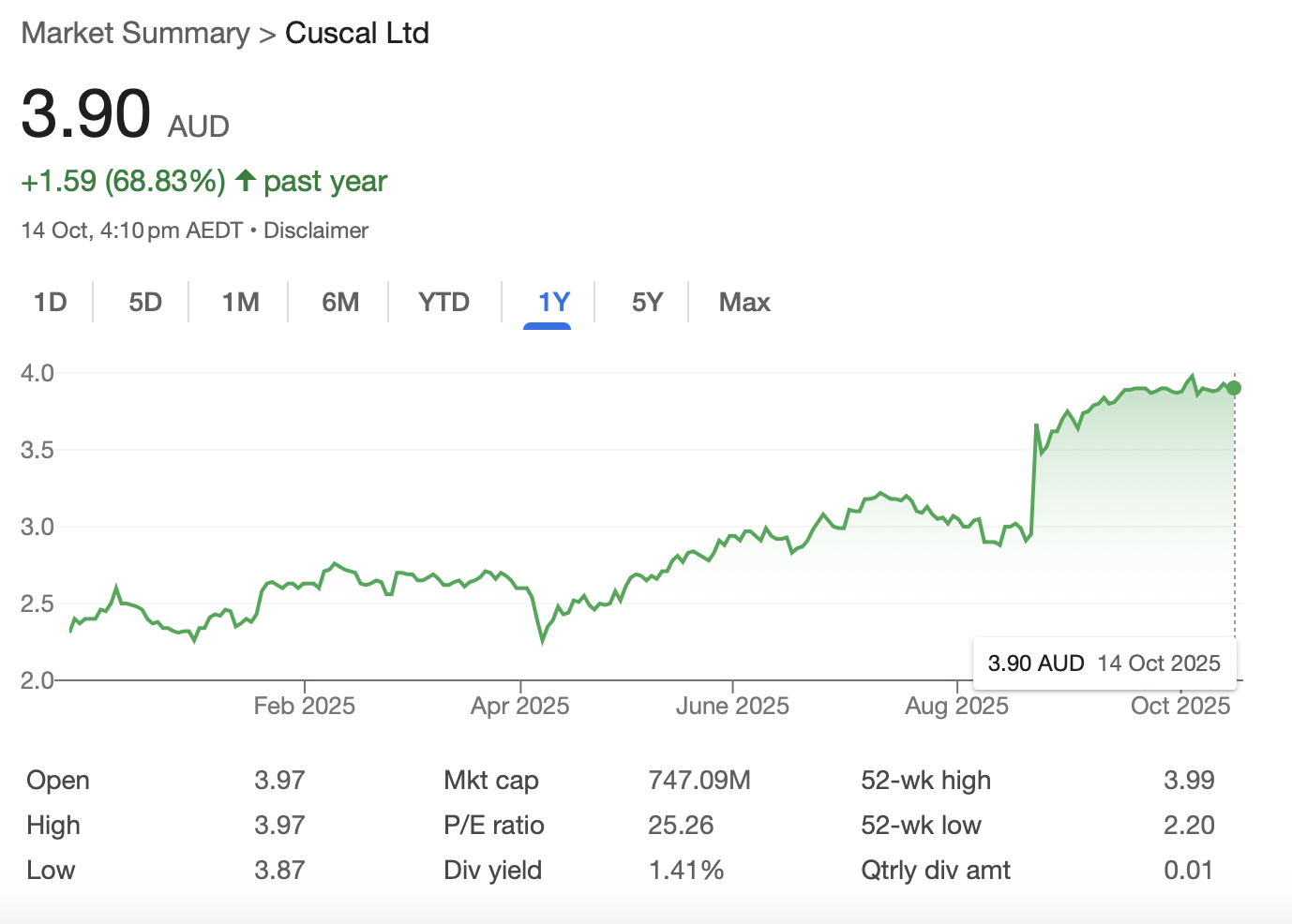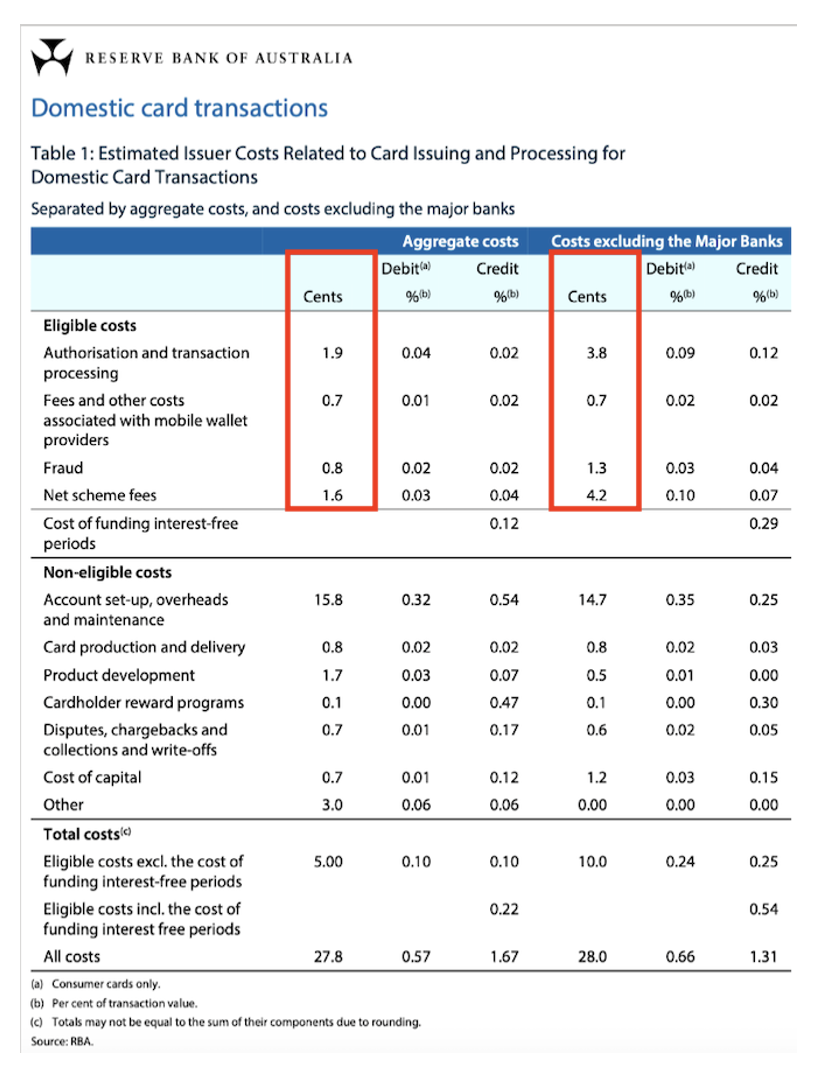RBA payments review - What it means for Cuscal, banks & fintechs
You’ve no doubt seen it in the press. Talk of potential changes to payments regulations and snippets of how it might impact various businesses, usually accompanied by quotes of angry (and biased) stakeholders worried about the negative impact on their interests.
As Livewire readers will know, Cuscal (ASX:CCL) is a top holding for Inception Fund, and has been since we wrote about it on Livewire at the IPO last year at $2.50/share.

We have a vested interest in understanding the potential implications for Cuscal, its peers and the broader industry. For that reason, we’ve spent considerable time diving into the details including talking to the key players, their customers and industry experts.
We thought Livewire readers, many of whom likely have investments in those directly or indirectly impacted, might find it helpful to read an overview of the RBA review, the impact on various companies and what we expect to see from here.
So here it is.
RBA Review, Proposals and Ongoing Discussion
The RBA conducts a Payments Review every 5 years to ensure the payments system is operating as intended and the regulations are fit for purpose.
Earlier in the year the RBA proposed several potential changes, opened it up for discussion and is now considering the input from industry before announcing their final decision.
One important point to make at the outset is that the likes of Apple, Google and American Express are currently not under the purview of the RBA. However, legislation is currently being passed that will modernise the Payments System Regulation Act of 1998. In other words, the government is highly likely to come for ‘Apple and Co’ soon.
Of particular note for our investment in Cuscal, and for fintechs like SmartPay (SMP), Tyro (TYR) and some of the Tier 2 banks like Bendigo Bank (BEN) and MyState (MYS), were two proposed changes.
1) The likely banning of surcharging and 2) the potential reduction of interchange fees on both debit and credit card payments.
Firstly surcharging, which is the addition of fees to a card transaction originally meant to offset the cost of accepting payments, is almost certain to be banned given the political support behind doing so. Ultimately paid by the consumer, the RBA expects $1.2b of consumer savings because of the ban.
There remains a small portion of Australians who stubbornly refuse to pay this fee and instead use cash. What we expect to happen from the surcharge ban is that this market will transition to debit card, modestly increasing the total addressable market for CCL.
Ironically, that extra ~50c surcharge fee you pay when buying a coffee probably doesn’t get removed, rather you’ll likely pay the same total cost just without the surcharge component.
Different businesses will be impacted to varying degrees from the surcharge ban. SmartPay built an entire business model on surcharging, providing the terminal and acquiring piece to the merchant for free. SmartPay, now being acquired by Shift4, is a Cuscal client.
But the likes of SmartPay will adjust. They publicly stated an expected Australian business revenue decline of up to -10% from the surcharge ban as they transition their revenue model. SmartPay does have other revenue models in the market, including per transaction and leasing, and the cost of switching likely prevents a mass exodus to other providers meaning the transactions going through Cuscal’s network should be retained.
Shift4 now becomes a reasonable client of Cuscal, having also acquired Global Blue (another Cuscal client). They are a much bigger organisation with more diverse revenue streams than SmartPay alone. While positive in offsetting the surcharge ban risk this does raise another potential question of, to what extent can Shift4 and other large customers internalise the capabilities currently being provided by Cuscal?
We’ll touch on that in a moment but suffice to say that on balance we expect the surcharge ban to be neutral to modestly positive for CCL.
Key Takeaway 1: The surcharge ban is likely given political support. Businesses like SmartPay (now being acquired) and to a lesser extent Tyro will need to adapt, but the stickiness of their offering should reduce the risk of excessive churn. The impact to Cuscal will be modestly positive. Don't expect cheaper coffee.
Interchange is where it gets more interesting. From the (expected) $1.2b of reduction in surcharging revenue, the RBA have endeavoured to reduce the cost of making payments by a similar amount to offset. They propose to do this by reducing interchange fees on both debit and credit.
Interchange fees, which have been regulated by the RBA since 2003, are intended to cover the basic costs of issuers in facilitating a transaction. They are not intended to be a profit generator or to cover value added services like rewards programs or travel insurance.
The majority of payments Cuscal handles are debit, so the proposed credit changes are not overly material to them, despite credit interchange fees comprising the bulk (~$900m) of the intended $1.2b reduction.
Key Takeaway 2: It’s mainly the big banks that dominate credit cards, and no one favours saving them, so credit interchange caps are likely to reduce at least to some extent. The impact on you? Expect less Qantas Points.
Back to debit interchange.
In simple terms, the RBA conducted an analysis of debit interchange and found that the average interchange fee has fallen to 6c/transaction, well below the current hard cap of 10c or 0.20%, and the weighted average cap of 8c. They have therefore proposed lowering the hard cap to 6c to return interchange to its original stated goal of covering basic transaction costs.
The issue here, and the cause of outrage for smaller issuers, is that the cost for facilitating a transaction (known as ‘eligible costs’) varies greatly for a big 4 bank vs a smaller issuer.
In aggregate the average cost of facilitating a transaction is 5c, but when the big 4 is removed that rises to 10c, meaning small issuers are in many cases already losing money on the average transaction.

It is important to note that Cuscal is not directly impacted by the proposed change as interchange fees are passed through rather than collected. The issue, and our reason for more investigation, is the potential indirect impact on Cuscal over time if their clients (small issuers) are worse off.
There are a couple of points we see here as offsetting this risk.
“We are very much hearing those concerns loud and clear,”
- Ellis Connolly, RBA Head of Payments
The dominance of the big 4 in Australia is so extensive such that the next largest issuer in Australia has just 1.5% market share. In our view, it is highly unlikely that the RBA would intentionally impose regulations that clearly benefit the big 4 at the expense of everyone else, and indeed the RBA have since publicly stated they are listening to the feedback and willing to consider it.
Key Takeaway 3: We view it as reasonably likely that the RBA will respond to the feedback from small issuers with changes to their prior proposal. One option would be a tiered system where interchange fees are capped for larger issuers but uncapped for smaller issuers.
The RBA would only need to look at the UK/Europe vs the US for a case study. In the UK/Europe, which has a blanket cap on interchange, fintechs have struggled compared to how they have flourished in the US, which operates a tiered system.
That touches on another offsetting risk for Cuscal here. The bulk of CCL’s clients are tier 2 banks, credit unions and mutuals that each generate revenue from many sources. Should interchange caps be reduced, these clients, as they have in the past, would offset the impact by increasing fees elsewhere – account keeping fees, fewer fee free transactions, higher interest, etc.
It’s worth remembering that Cuscal’s scale and cost advantages are significant, and in many cases rival or in some cases exceed the big 4 (for example, in NPP). Payments is a scale game. It’s not so much about charging more per transaction than it is pushing more volumes through a fixed cost base. Any regulatory changes that solidify these cost advantages would only serve to strengthen CCL’s competitive position.
Key Takeaway 4: Even if the debit interchange caps are adjusted as currently proposed, there are significant offsetting risks for Cuscal and the likelihood their scale and cost advantages are actually strengthened. It would be a modest negative for small issuers like Bendigo, but they have offsetting levers to pull. Smaller fintechs would be the most impacted.
Back to the question, what ability do CCL clients have to internalise capabilities provided by CCL?
Firstly, smaller institutions, and in this group we’d include tier 2 Australian banks, often just don’t have the balance sheet or volumes to make the ROI work. In fact, we’d argue there is more likelihood that some of the bigger players start to go the other way and outsource to Cuscal.
But the large, global institutions certainly do have the funding to build out Cuscal-like infrastructure, if they wanted to. To help explain this risk we found some examples most useful.
Take Square. There was quite a bit of media noise when Square made the decision to internalise functionality that Cuscal provided, but it wasn’t that simple.
Square set up in Australia using Cuscal to provide a quick market entry. As a global operator they were already scheme members of Visa and Mastercard. Once they had achieved sufficient volumes in Australia they switched to acquiring transactions as a principal member of those schemes.
However, Square still processes EFTPOS transactions through Cuscal. Given EFTPOS is cheaper than V/MA there is a significant incentive for Square to push transactions through it, meaning it is likely that Cuscal still process the bulk of Square’s acquiring transactions in Australia, and will likely continue to do so.
What can make V/MA cheaper than pushing through EFTPOS is the rebates given to large scale payments operators. But even for many of these companies it would make a lot of sense to give up the direct scheme membership, move under Cuscal’s sponsorship and negotiate a share of the rebates that Cuscal receives as one of the largest operators in the market.
Key Takeaway 5: At the heart of our Cuscal thesis is the expectation that Cuscal’s scale and cost advantages should strengthen over time. If this is true then the business can be classed as a quality compounder and will deserve a premium multiple, significantly higher than where it trades today. While it remains unproven given Cuscal’s relatively short listed life, our ongoing work has increased our conviction that this is the case.
With the merger of Indue (which is still subject to regulatory approvals before completion) Cuscal very much dominates the aggregator market. ASL is the only other player of any merit.
But it’s also true that the big 4 are competitors to Cuscal and could open their internal systems to Cuscal clients if they wanted, a competitive tension that will keep CCL’s prices from rising too high.
ASL until recently was probably destined for the same path as Indue. The acquisition by Banking Circle means it now has a well funded parent, and we were interested in understanding the rationale for the deal and the potential implications for Cuscal.
The acquisition of ASL gave Banking Circle access to all payments system in Australia, the ability to take deposits and the functionality to direct their existing cross border transactions through ASL’s systems. For ASL, it basically gave them a lifeline.
But having a well-funded parent is one thing. It doesn’t necessarily give ASL the scale and volume to compete on cost with Cuscal.
Further, we understand that one client makes up almost all ASL’s revenue creating significant concentration risk. There may be more chance that this client shifts to Cuscal, than Cuscal clients shift to ASL.
We noted it earlier, but it is important to note again – the Cuscal/Indue merger, which is clearly a completely transformational deal – is still not done and dusted. It remains subject to regulatory approval including from the ACCC.
We view the risk that the ACCC would block the transaction as low. The mutuals that would have kicked up a fuss if they saw an issue are both Indue clients and shareholders and have already approved the transaction. No doubt competitors like ASL and FiServ may have something to say, but while we view CCL’s competitive position as strong, competition (and alternatives) still exist.
That said, predicting the actions of any regulator is tough, so we will wait and see. The stock has started to price in some of the value created by the Indue acquisition, but if/when it is approved, we expect there is more to go.
Key Takeaway 6: The Cuscal/Indue merger is a truly transformational one, as the initial share price reaction has implied. The synergies are substantial (up to $20m per annum) and appear achievable. The deal requires final regulatory approvals so is not yet risk free, though should this hurdle be cleared we expect the share price re-rate has further legs.
Hopefully, this note has helped simplify your understanding of what the RBA payments review means for Cuscal, the Banks and the broader fintech space.
We understand the RBA intends to announce their final decision before the end of 2025, so we won't have to wait long to find out if the analysis provided above is on the mark or not.
4 topics
10 stocks mentioned

